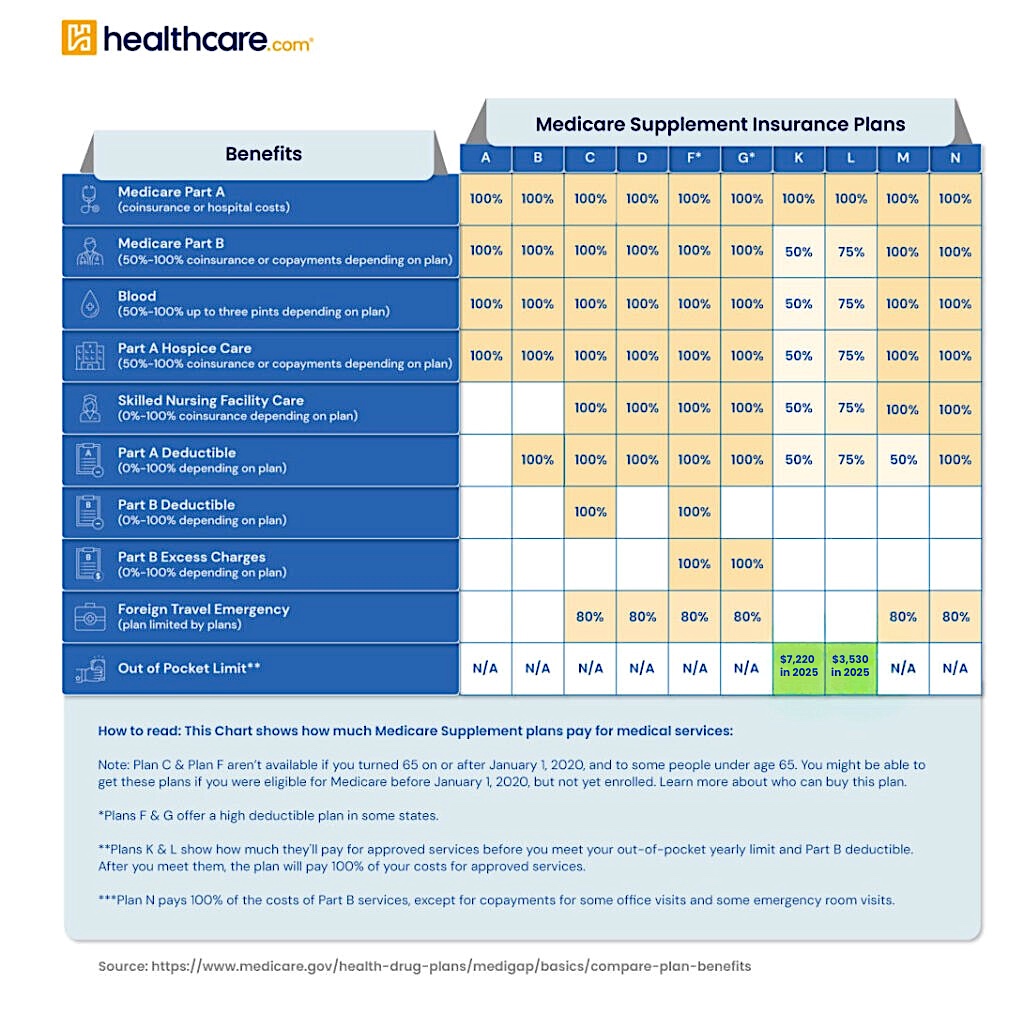Written by Melinda Sineriz
HealthCare Writer
We aim to help you make informed healthcare decisions. While this post may contain links to lead generation forms, this won’t influence our writing. We follow strict editorial standards to give you the most accurate and unbiased information.
What You Need to Know
- Medicare Supplement plans, also known as Medigap, help pay for out-of-pocket costs not covered by Medicare Part A and Part B.
- Illinois insurance companies must accept your Medicare Supplement (Medigap) plan application if you’re in your Medigap Open Enrollment Period or have guaranteed issue rights.
- The three most popular Medigap policies are typically Plans F, G, and N.
What Are Medicare Supplement Plans in Illinois?
Medicare is a federal health insurance program for individuals aged 65 and older, as well as younger people with qualifying disabilities or health conditions (e.g., end-stage renal disease).
Original Medicare includes Part A (Hospital Insurance) and Part B (Medical Insurance). While it covers many healthcare services, it still leaves you responsible for out-of-pocket expenses like deductibles, copayments, and coinsurance. Medicare Supplement plans help cover these costs.
Medigap plans are standardized by letter (A through N). That means Plan A from one company offers the same benefits as Plan A from another, though premiums and service may differ.
Learn how these plans work and how they benefit residents of Illinois.
When Can You Enroll in a Medicare Supplement (Medigap) Policy?
You can apply for a Medigap plan at any time. However, outside of your Medigap Open Enrollment Period—or without guaranteed issue rights—insurers may use your health history to deny coverage or charge higher premiums.
Your Medigap Open Enrollment Period lasts for six months and begins the month you’re both age 65 (or older) and enrolled in Medicare Part B. During this time, insurers must offer you any plan they sell at standard rates, regardless of your health status.
Birthday Rule: Policyholders ages 65–75 can switch Medicare supplement plans annually without medical underwriting, but only within the same block of business and with equal or lesser benefits. They must be notified 30–60 days before their birthday and have a 45-day enrollment window after. Effective 1/1/2022; starting 1/1/2026, switches may be made with the same issuer or an authorized affiliate.
You may also qualify for guaranteed issue rights if you lose other coverage or switch from a Medicare Advantage plan back to Original Medicare under certain conditions.
Compare options HERE & start your health plan journey.
What Are the Most Popular Medicare Supplement Plans?
Nationwide and in Illinois, the most commonly selected Medigap plans are:
- Plan F – Offers the most comprehensive coverage, but is only available to those eligible for Medicare before January 1, 2020.
- Plan G – Covers nearly all costs except the Medicare Part B deductible.
- Plan N – Covers most major expenses but includes copayments for some office and emergency room visits and does not cover Part B excess charges.
All Medigap policies with the same letter provide identical benefits, regardless of the insurer.
How Do You Choose a Medicare Supplement Plan?
Start by choosing a plan letter (e.g., Plan G or Plan N) based on your expected healthcare needs and budget. Consider how much you’re willing to pay in premiums versus out-of-pocket costs like copays.
Next, compare the same plan across different insurers. Although coverage is standardized, prices vary depending on how each company sets rates. Insurers use one of three pricing models:
- Attained age rating: Premiums increase as you age.
- Issue age rating: Premiums are based on the age when you purchase the policy and don’t increase due to aging.
- Community rating: Everyone pays the same premium, regardless of age.
Always compare the same plan across insurers—Plan G vs. Plan G—to ensure you’re making an accurate cost comparison.

How Much Do Medigap Policies Cost?
Medigap premiums in Illinois vary based on:
- Your age and gender
- Tobacco use
- The plan you choose
- The pricing method used by the insurer
Plan benefits are standardized, but monthly costs may differ significantly between companies.
Compare options HERE & start your health plan journey.
What If You Want to Change Your Medicare Supplement Plan?
You can apply to change your Medigap plan at any time. However, unless you have guaranteed issue rights, insurers may underwrite your application based on your health and may deny coverage or charge higher premiums.
It’s generally easier and more cost-effective to choose the right plan during your initial Open Enrollment Period.
What Are Alternatives to Medicare Supplement Plan?
Medicare Advantage plans, also known as Part C, are an alternative to Original Medicare. These plans are offered by private insurance companies and typically include:
- Part A (hospital insurance)
- Part B (medical insurance)
- Most also include Part D (prescription drug coverage)
Many Medicare Advantage plans offer additional benefits such as dental, vision, hearing, and fitness memberships. Instead of enrolling in both a Medigap and a Part D plan, you may prefer the simplicity of a Medicare Advantage plan.
Learn more about Illinois Medicare Advantage plans.
Shop for a Medicare plan with additional benefits!
Medicare Part D?
Medicare Part D plans offer standalone prescription drug coverage.
- Who needs it: People enrolled in Original Medicare who want drug coverage
- What it covers: Prescription medications. Coverage and cost vary by plan.
- How it’s offered: Through private, Medicare-approved insurers
- Not needed if: You’re already in a Medicare Advantage plan that includes drug coverage
Do Medigap Plans Cover Prescription Drugs?
No. Medigap plans do not include prescription drug coverage. If you need medication coverage, you must enroll in a separate Medicare Part D plan.
Medicare Resources in Illinois
Residents of Illinois can access free assistance and information through the following programs:
- Senior Health Insurance Program (SHIP): Offers one-on-one Medicare counseling. Call 1-800-252-8966 or email aging.ship@illinois.gov.
- Illinois Department of Insurance: Provides regulatory oversight and allows consumers to file complaints.
- Illinois Medicaid Program: Offers healthcare coverage for eligible low-income individuals and may coordinate with Medicare. Apply online or call 1-800-843-6154.
Next Steps
If a Medicare Supplement plan in Illinois fits your needs, take the next step by comparing plans available in your area. You can browse options online or connect with a licensed insurance agent for expert guidance and personalized support.
Thank you for your feedback!
U.S. Government Website for Medicare. “Choosing a Medigap Policy: A Guide to Health Insurance for People with Medicare.” medicare.gov Accessed April 15, 2021. 6.
U.S. Government Website for Medicare. “Part B Costs.” medicare.gov. Accessed April 15, 2021.
“Choosing a Medigap Policy: A Guide to Health Insurance for People with Medicare.” 9.
“Choosing a Medigap Policy: A Guide to Health Insurance for People with Medicare.” 14.
“Choosing a Medigap Policy: A Guide to Health Insurance for People with Medicare.” 22-24.
America’s Health Insurance Plans. “State of Medigap: Trends in Enrollment and Demographics.” medicare.gov. Accessed April 15, 2021. 9.
New Jersey Department of Human Services.
“Choosing a Medigap Policy: A Guide to Health Insurance for People with Medicare.” 10-11.
“Choosing a Medigap Policy: A Guide to Health Insurance for People with Medicare.” 18.
“Choosing a Medigap Policy: A Guide to Health Insurance for People with Medicare.” 6.
“Choosing a Medigap Policy: A Guide to Health Insurance for People with Medicare.” 14.
“Choosing a Medigap Policy: A Guide to Health Insurance for People with Medicare.” 50.







